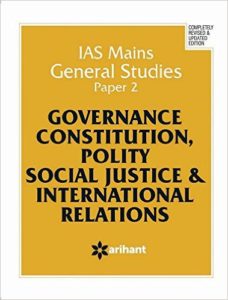General Studies 2 Paper Syllabus for UPSC Civil Services Mains Exam consists of the below major areas : Governance, Constitution, Polity, Social Justice and International relations. Detailed syllabus is given below:
General Studies 2 Paper Syllabus for UPSC Civil Services Mains
• Indian Constitution- historical underpinnings, evolution, features, amendments, significant provisions and basic structure.
• Functions and responsibilities of the Union and the States, issues and challenges pertaining to the
federal structure, devolution of powers and finances up to local levels and challenges therein.
• Separation of powers between various organs dispute redressal mechanisms and institutions.
• Comparison of the Indian constitutional scheme with that of other countries
• Parliament and State Legislatures – structure, functioning, conduct of business, powers & privileges
and issues arising out of these.
• Structure, organization and functioning of the Executive and the Judiciary Ministries and Departments
of the Government; pressure groups and formal/informal associations and their role in the Polity.
• Salient features of the Representation of People’s Act.
• Appointment to various Constitutional posts, powers, functions and responsibilities of various
Constitutional Bodies.
• Statutory, regulatory and various quasi-judicial bodies
• Government policies and interventions for development in various sectors and issues arising out of
their design and implementation.
• Development processes and the development industry- the role of NGOs, SHGs, various groups and
associations, donors, charities, institutional and other stakeholders
• Welfare schemes for vulnerable sections of the population by the Centre and States and the
performance of these schemes; mechanisms, laws, institutions and Bodies constituted for the
protection and betterment of these vulnerable sections.
• Issues relating to development and management of Social Sector/Services relating to Health,
Education, Human Resources.
• Issues relating to poverty and hunger.
• Important aspects of governance, transparency and accountability, e-governance- applications,
models, successes, limitations, and potential; citizens charters, transparency & accountability and
institutional and other measures.
• Role of civil services in a democracy.
• India and its neighborhood- relations.
• Bilateral, regional and global groupings and agreements involving India and/or affecting India’s
interests
• Effect of policies and politics of developed and developing countries on India’s interests, Indian
Diaspora.
• Important International institutions, agencies and fora- their structure, mandate.
• Functions and responsibilities of the Union and the States, issues and challenges pertaining to the
federal structure, devolution of powers and finances up to local levels and challenges therein.
• Separation of powers between various organs dispute redressal mechanisms and institutions.
• Comparison of the Indian constitutional scheme with that of other countries
• Parliament and State Legislatures – structure, functioning, conduct of business, powers & privileges
and issues arising out of these.
• Structure, organization and functioning of the Executive and the Judiciary Ministries and Departments
of the Government; pressure groups and formal/informal associations and their role in the Polity.
• Salient features of the Representation of People’s Act.
• Appointment to various Constitutional posts, powers, functions and responsibilities of various
Constitutional Bodies.
• Statutory, regulatory and various quasi-judicial bodies
• Government policies and interventions for development in various sectors and issues arising out of
their design and implementation.
• Development processes and the development industry- the role of NGOs, SHGs, various groups and
associations, donors, charities, institutional and other stakeholders
• Welfare schemes for vulnerable sections of the population by the Centre and States and the
performance of these schemes; mechanisms, laws, institutions and Bodies constituted for the
protection and betterment of these vulnerable sections.
• Issues relating to development and management of Social Sector/Services relating to Health,
Education, Human Resources.
• Issues relating to poverty and hunger.
• Important aspects of governance, transparency and accountability, e-governance- applications,
models, successes, limitations, and potential; citizens charters, transparency & accountability and
institutional and other measures.
• Role of civil services in a democracy.
• India and its neighborhood- relations.
• Bilateral, regional and global groupings and agreements involving India and/or affecting India’s
interests
• Effect of policies and politics of developed and developing countries on India’s interests, Indian
Diaspora.
• Important International institutions, agencies and fora- their structure, mandate.
Reference Books for General Studies Paper 2 [Suggestions by ClearIAS.com]
 The basic book-list recommended by many toppers is provided in the link IAS Books for UPSC Mains. If you need additional books/weblinks for reference, the below mentioned links might turn useful. Tip : You can search/buy online these books using the Flipkart/Amazon Search Box provided in this website. (Right Side Bar)
The basic book-list recommended by many toppers is provided in the link IAS Books for UPSC Mains. If you need additional books/weblinks for reference, the below mentioned links might turn useful. Tip : You can search/buy online these books using the Flipkart/Amazon Search Box provided in this website. (Right Side Bar)- Indian Polity for Civil Services Examinations – M. Laxmikanth. (Polity)
- Governance in India for CSE. (Governance – GS2)
- Pax Indica – Shashi Tharoor. (Foreign Policy – GS2)
- India and the World by Surendra Kumar. (Foreign Policy – GS2)
- The Constitution of India.
- An Introduction to the Constitution of India by M.V. Pylee.
- Introduction to the Constitution of India by Durga Das Basu.
- Select Constitutions by Anup Chand Kapur, A.C. Kapur & K.K. Misra.
- Fifty Years of Indian Parliament by G.C. Malhotra.
- Social Theory, Development Administration & Development Ethics by Mohit Bhattacharya.
- Our Parliament by Subhash Kashyap.
- Public Institutions in India: Performance and Design by Devesh Kapur & Pratap Bhanu Mehta.
- Challenge and Strategy: Rethinking India’s Foreign Policy by Rajiv Sikri
- Does the Elephant Dance?: Contemporary Indian Foreign Policy
- India’s foreign policy – V P Dutt.
- ARC reports; special focus to the fourth report on Ethics in Governance and the fifth report on Public Order.
- PIB.
- India.gov.in for Welfare Schemes.
- Articles from Planning Commission Website.
- The Diplomat Magazine.
- Briefs on Foreign Relations from MEA.
Tip : Use reference textbooks selectively as the available time is limited

